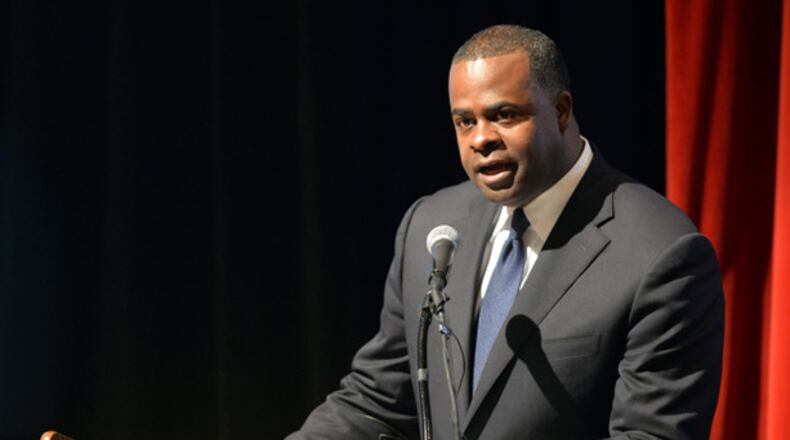Atlanta Mayor Kasim Reed defended on Wednesday payments his administration gave to select employees under a little known “hardship” program. And during a heated meeting, Reed clashed with a councilwoman who says the payouts are illegal.
Speaking to the council's finance committee, Reed insisted the payouts — some as high as five-figures to at least three executives, including Police Chief George Turner — did not violate city code. But he acknowledged that the decisions to allow some workers to trade unused vacation, sick or compensatory time for cash lacked documentation and could raise fairness concerns from other employees.
“We acknowledge this was an error,” Reed said. “We’ve said we’re not going to continue the practice going forward.”
The Atlanta City Council, after hearing complaints from several workers, called for Reed's administration to explain payments that Human Resources Commissioner Yvonne Yancy and Chief Financial Officer Jim Beard granted to nine employees since 2012.
Turner, the city’s top earner with a $241,000 salary, was paid more than $80,000 last year for nearly 700 hours in unused vacation time. That’s nearly twice the amount city code allows employees to carry over.
Two Reed deputies were each paid roughly $30,000 for hundreds of hours in unused vacation, sick and comp time. Three other employees were paid a combined $6,000 for unused vacation time. And three city workers were granted a combined $12,000 in advance pay — effectively a loan against future earnings.
Many employees have decried the so-called “hardship” payments as unfair, with some repeating Wednesday that they were unaware such an option existed.
District 9 Councilwoman Felicia Moore has gone further, calling the actions “illegal.”
Among her concerns, Moore points to city code that states vacation time is only paid when an employee retires, is fired or quits. She has called for Beard and Yancy to be disciplined and the money to be returned.
Though city attorneys have previously said the laws are “confusing” on the issue, Reed cited two code sections Wednesday that he believes gives Beard and Yancy broad discretion to grant the payments. The mayor said that creates a “conflict” with other sections of the law.
Reed and Moore traded harsh words over the issue. At one point, the mayor challenged Moore’s assertion the payments were illegal — claiming Moore “doesn’t have the background and knowledge base to back that up” because she isn’t an attorney.
He also said Moore was inviting a defamation lawsuit and challenged her to explicitly state that Beard and yancy broke the law, “and take with it the personal liability that is attached to that statement.”
Moore would not take the bait, but maintained that she believes the payments violated code. “I have my opinion, and my opinion is the actions were illegal,” she said. “…I’ve said it many times and I’’ll keep doing it, so sue me.”
Chief Operating Officer Michael Geisler, as well as Reed, attempted to portray the actions as minor compared to decisions made under former Mayor Shirley Franklin. Both men said as many as 200 employees left the city between 2002 and 2009, collected leave payouts, and were hired back in short order.
The Atlanta Journal-Constitution has requested documents backing up those claims. It’s unclear whether those actions, if true, violated any city procedures.
Moore said discussing the previous administration wasn’t germane to the present issue. Reed maintained that it was and asked why councilmembers haven’t raised questions about those practices.
Franklin said she was not aware of employees who left and were immediately rehired. But she said some employees retired, and through council approval, were rehired as contract employees.
“Without knowing the details of the allegations it is impossible to respond substantively,” she said. “Nor am I certain it is my responsibility to investigate the facts or evidence for any purpose.”
Reed officials still didn’t explain Wednesday why some employees were allowed to keep and cash-in leave exceeding caps set by city code.
Nor did any public official raise the question of whether public tax dollars should be used to assist employees experiencing hardship.
Though the mayor vowed to discontinue the practice, he said he’s exploring whether to compensate employees who experienced hardship in recent years, but were not afforded this option. That possibility, he said, could cost the city $2 million.
Councilmembers said they will now review documents provided by Reed’s administration before the hearing.
District 8 Councilwoman Yolanda Adrean said she was encouraged to hear the mayor acknowledge the process for awarding hardship pay should have been clearer.
“I’m hoping it opens up a dialogue with employees,” she said. “Because we really need to restore that relationship.”
About the Author
Keep Reading
The Latest
Featured


